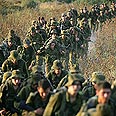
Exemption for all
Israel should excuse all who object to army service on religious grounds, writes Yossi Beilin
The law gives yeshiva students a year off at age 23, to undertake vocational training, non-religious study, or to tour the world without being drafted.
At the end of the year, the student is offered a choice: shortened army service, followed by reserve duty, meaning the student can join the labor force, or he can return to full-time yeshiva study.
Before and after the “decision year”, students must stay exclusively in yeshiva or risk losing their government stipends, even if they are fit to work.
Since the law went into affect, just 31 yeshiva students have chosen to enlist in the IDF, and only about a thousand have taken the chance to leave yeshiva study for a year.
No surprise
None of this surprises me. No Israeli government could be proud of conscripting all the yeshiva students. But the true problem was never the IDF’s blanket exemption for these people, many of who are not just non-Zionist, but anti-Zionist.
Rather, the true problem is that these people play no role in the work force (at least the legal work force, that is). According to some estimates, the yeshiva community bilks about 3 billion shekels per year from the economy.
When I was Minister of Economy and Planning, I asked Prime Minister Yitzhak Rabin to propose a law that would exempt any applicant from mandatory army service who applied on religious or moral grounds.
I said such a law would allow ultra-orthodox youngsters who don’t serve in the army to enter the work force, to study outside the yeshiva context, without the country needing to finance their studies or help so many yeshivas, since a large number of ultra-orthodox people become yeshiva students only to avoid army service.
Unique in Jewish history
Until the State of Israel was created, there was never a period in Jewish history in which an entire community studied, with almost no source of income. By excusing yeshiva students from army service on condition they remain in full-time study,the state played a large part in increasing their numbers.
The army became the “truant officer” for the yeshiva world. By threatening to drag truant students off the army, the IDF itself ensured large numbers of ultra-orthodox young people would remain in yeshiva instead of joining the work force and wider Israeli society.
Rabin decided to leave the status quo alone, as his predecessors had done.
Tal Commission created
Several years later, in 1999, Ehud Barak’s election promise to conscript the ultra-orthodox, and several Supreme Court decisions on the matter led to the formation of the Tal Commission.
But the law it produced has no teeth: the decision to grant yeshiva students a “decision year” at age 23 is the result of orthodox pressure. The secular members of the commission wanted the “decision year” to be at age 18, but the haredim wanted to ensure, as best as possible, that the individual in question have several children, in order to make him wholly dependent on the orthodox ghetto, before making the decision.
Too soon to evaluate?
Three years would seem too short a time to evaluate the law’s success, but I don’t think it’s impossible. The more correct decision, and maybe the most dangerous of all, would be to allow the excuse everyone from military service on religious and moral grounds.
If the Knesset prefers to maintain the current situation and the Tal Law, then let the system – private or governmental – to establish a special framework to “house” the orthodox kids on their “decision year”, and to make it possible for them to make an honest choice.
These kids don’t know Hebrew very well, don’t know English, don’t excel in sciences and don’t know how to work a computer. So when the government offers them the chance to go out into the wider world for a year, they naturally prefer the security of a government stipend. They have no idea how to cross the street from the closed ghetto to the wider world.
If there is no system to use the “decision year” to give ultra-orthodox students the tools they will need to make a living - the number of students choosing to leave the ghetto will continue to be negligible.
The decision is now ours: we must make it possible for yeshiva students to get out of army service and join the work force. We must build for them a system to continue their “decision year” in order for them to truly make a decision whether to return to full-time yeshiva study or to join the army.
The other option is to maintain the status quo, to continue the ping-pong game between the Supreme Court and a government that won’t let them work.










